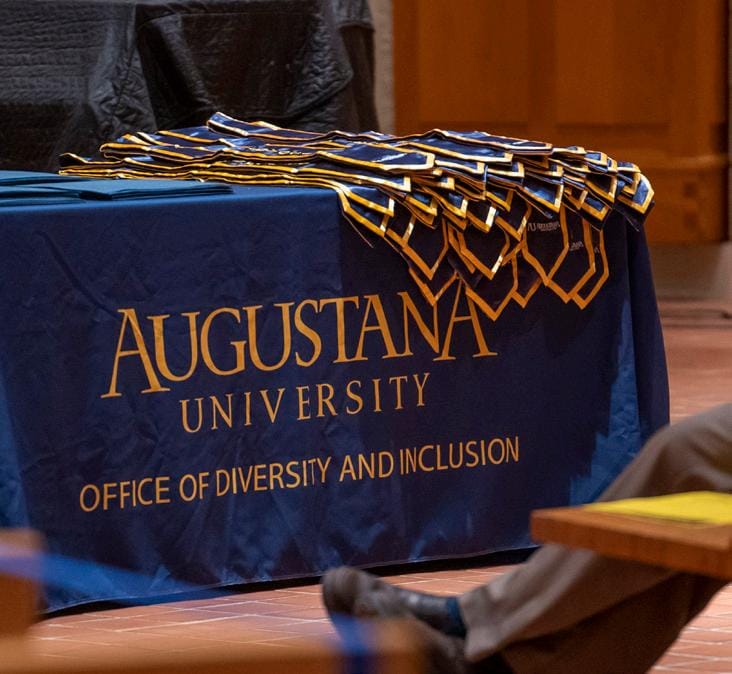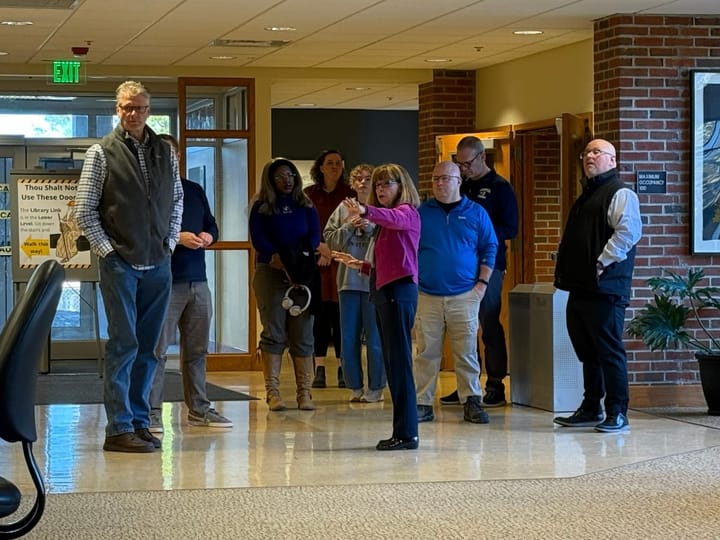DEI office replaced amid federal pressure

Augustana has dissolved its Office of Diversity, Equity and Inclusion, a move administrators call a “strategic evolution.”
While the university frames this decision as a way to “infuse” diversity, equity and inclusion (DEI) efforts across campus, the quiet rollout has created uncertainty among those it was meant to support.
The restructuring elevates Willette Capers — formerly the Assistant Vice Provost for Diversity, Equity and Inclusion — to a more administrative role as Assistant Vice Provost for Academic and Intercultural Development, where she oversees the Center for Global Engagement, the Student Success Center, the Center for Teaching and Scholarship, and academic integrity.
Other DEI responsibilities were shifted to a new Assistant Director of Community and Belonging, replacing the former DEI assistant director role left vacant after Tyra Hawkins’ unexpected departure this fall.
The restructuring followed Augustana’s quiet removal of the DEI portion of its website, which had featured materials such as the university’s diversity statement, land acknowledgment and inclusive language guide.
The removal came less than a week after the Department of Education sent a letter on Feb. 14, warning universities of potential federal funding loss over DEI programs months before the restructuring officially began.
Provost Joel Johnson confirmed that the removal was in response to the federal warning.
“We did do as most institutions were doing — an audit of our website to see if there was anything that presented greater or lesser risk — and so there were some modest changes to our website at about that time,” Johnson said.
The action struck some students as a contradiction between the university’s public commitments and its behind-the-scenes decisions.
“We were always promised that we’re not gonna fold, and then as soon as that happens, you folded — and mind you [during] Black History month,” senior Jenna Hageman, lead peer mentor of the Journey Scholars program, said.
In response to political pressure, universities across the country have rebranded their DEI offices with terms like “student success” or “engagement.” Augustana chose “community and belonging.”
Acknowledging that words have become “very politicized,” Johnson said the new language is more encompassing of the university’s ultimate goals compared to DEI. He described the change as a careful act of due diligence that balances the external political environment with Augustana’s core mission.
According to Johnson, the restructuring was prompted by several staff changes in the spring of 2025, which provided an opportunity to reorganize the provost’s office. President Stephanie Herseth Sandlin said the primary goal was to embed DEI work more deeply into the university’s structure
“It’s about more collaboration, more integration, more ownership of the work, and then coordinating action plans around the goals associated with what we’ve outlined in our own diversity plan,” Herseth Sandlin said.
Johnson said that the changes are about how the university implements its goals, not the goals themselves. He noted that the university’s official Diversity, Equity and Inclusion Plan, which was first adopted in 2019, has not changed.
Student-facing programming will continue under the new Assistant Director of Community and Belonging, who will oversee the Journey Scholars program and work closely with the Division of Student Affairs. Johnson said The university is in the final stages of hiring for that position and hopes to fill the role by October.
Capers’ updated position grants her a seat on the Provost Faculty Council and greater influence over university policy. She described her new role as a way to connect departments.
“Instead of folks seeing people separately, I can be that one connector to bring these things together,” Capers said.
Dean of Students Beth Elam added that the goal of restructuring is to make DEI “the responsibility of all of us on campus, not just one person.”
Johnson framed the elimination of a standalone office as a sign of progress and maturity.
“A lot of times with institutions when something is fairly new to them, it starts off as a more isolated office or initiative,” Johnson said. “As it becomes more commonplace and integrated then you see it as being a priority across the institution rather than located in one spot.”
Despite the administration’s clear vision, many students and faculty reported a lack of communication about the changes.
“The only way I knew about the DEI office being removed was from fellow students who had heard it through the grapevine,” said junior Maya Madson, a board member of the Asian Student Association. “I felt like I didn’t get the transparency I deserve as someone who directly benefited from this office existing.”
Hageman shared a similar concern.
“I knew that we didn’t have an office in the summer because Tyra told me,” Hageman said. “But then I’m talking to my peers and nobody knows—professors don’t even know.”
English professor Daniel Gerling, graduate of the university’s DEI advocacy course, agreed.
“There has been almost zero discussion of it,” Gerling said.
Johnson acknowledged that communication about the restructuring was primarily directed at faculty and that “broad emails to students about structure that typically isn’t done.”
Some students viewed the removal of the independent office as more than a structural change.
“I wish DEI didn’t have to exist, that it was an integral and foundational concept, but when institutions used to be segregated and exclusionary, then DEI must exist now as its own body, its own office, because our issues have long been overlooked and our populations long underrepresented,” Madson said.
In response to these concerns, Johnson urged patience, asking the community to give the new structure a chance, support Hawkin’s successor, and re-evaluate the updated system as it develops.



